Contact Us
Phone: (202) 885-2940
Graduate programs: spagrad@american.edu
Undergraduate programs: aupublicaffairs@american.edu
#SPACyber
#SPACyber is a practioner informed, research driven hub of cyber curriculum, thought leadership, and engagement. Focused on the national and homeland security implications of the internet our faculty, students, and partners collaborate around the common goal of understanding and ultimately informing U.S. cyber policy and the organizational structures and leaders who drive it.
For more information about the Cyber Policy & Management graduate certificate, contact the SPA Cyber Certificate team at spacybercert@american.edu.
Diana Burley and Sasha O'Connell to present at RSA Conference
Despite efforts to build the cyber workforce, shortages persist. Anecdotal evidence suggests that employers may be looking for cyber unicorns, early career entrants with experience far beyond realistic expectations. This session, led by SPA's Diana Burley and Sasha O'Connell on May 9th, will discuss why persistent workforce gaps may be the result of a search for cyber unicorns and recommend strategies for avoiding the trap.
Learn More
SPA Cyber Alum Speaks at White House Event

On March 30, SPA Cyber Alum Mercedes Subhani spoke at the Women in Cyber Webinar hosted by the White House Office of the National Cyber Director.
2023 Aspen Cyber Summit
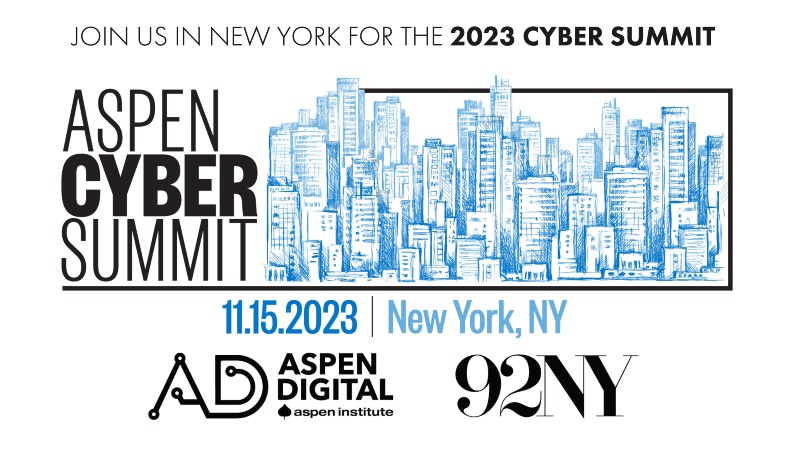
Top cyber leaders, including SPA's Diana Burley, came together on Wednesday, November 15, 2023 for the 8th annual Aspen Cyber Summit to discuss latest threats, opportunities, and policy trends in cybersecurity and emerging technology.
Learn More
14th Annual Billington Cybersecurity Summit
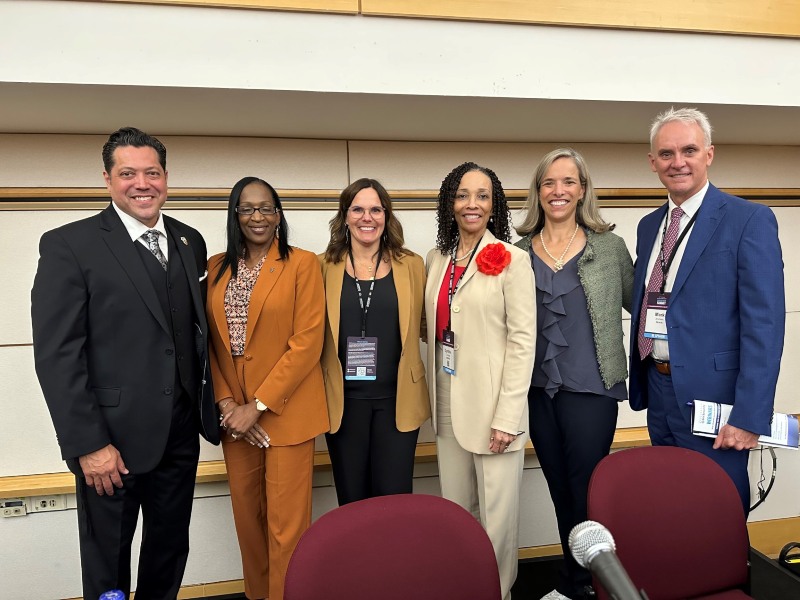
On Sept. 7, SPA's Sasha O'Connell spoke at the 14th Annual Billington Cybersecurity Summit about unleashing the power of diversity in your cyber workspace!
Learn More
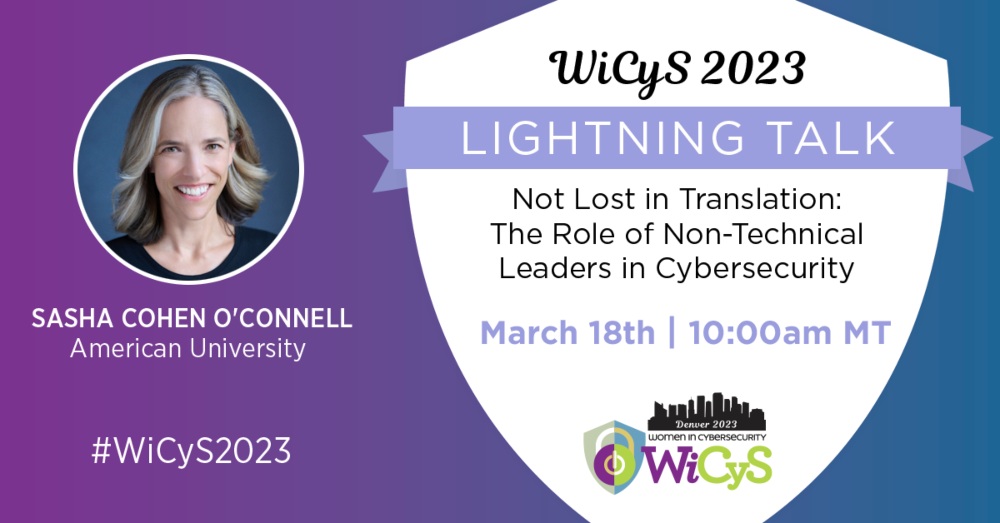
WiCyS 2023
On March 18th, 2023, SPA Professor Sasha O'Connell spoke on her role as FBI's chief policy advisor for science & tech.
Learn More
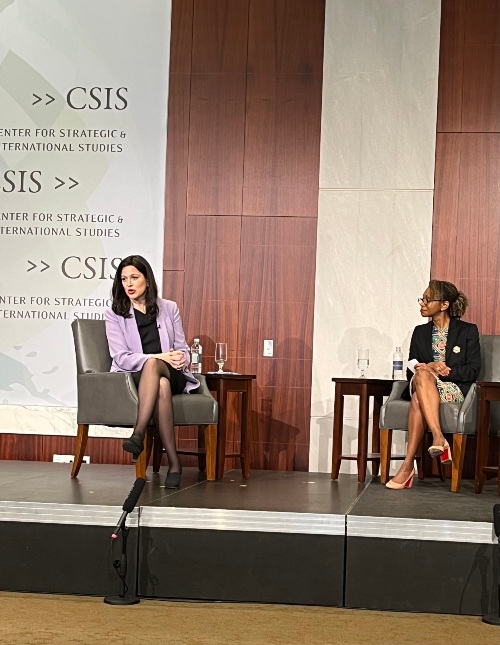
National Cybersecurity Strategy Event
SPA was proud to adapt this piece from a blog post by student Clarissa Gallo (MS THSP, `23), who represented the school at the National Cybersecurity Strategy event.
After months of anticipation, the Biden-Harris Administration released its National Cybersecurity Strategy on Thursday, March 2nd. To celebrate its debut, the Center for Strategic and International Studies (CSIS) hosted a panel event that same day. Cybersecurity professionals from all sectors gathered at the organization's headquarters to hear from two of the most prominent cyber figures within federal government: Kemba Walden (Acting National Cyber Director) and Anne Neuberger (Deputy National Security Advisor for Cyber and Emerging Technologies).
Acting Director Walden provided opening remarks about the Strategy's importance, noting that its "ultimate goal is a digital ecosystem that is more inherently defensible, resilient, and aligned with our values." The Strategy, she continued, echoes previous policies but takes a new approach to the desired digital ecosystem, including "rebalancing the responsibility to defend cyberspace [and] incentivizing investments in a resilient future."
Following the opening remarks, moderator and CSIS Senior Vice President James Lewis led the two cybersecurity figures in a discussion of document’s underlying themes, including regulation, the modernization of information technology (IT), adversary disruption, implementation, and government partnerships with other sectors.
Neuberger described the potential shape of such a partnership, via sector-specific regulations for the "vulnerable" critical infrastructure mentioned in the Strategy: "As we look at putting in place these minimum cybersecurity practices, we want to ensure that's done in collaboration with the private sector; [such as with] active discussions by that sector lead agency or regulator to get private-sector feedback,” she said.
Later, Lewis posed audience questions to Walden and Neuberger, on topics from software liability reform to harmonizing regulation and the role of stakeholders. The final question came from this author, asking, "How does this strategy consider emerging technology and the need to anticipate future security needs and efforts?"
"[T]he fundamental principle of the strategy is to say we need an open, secure, and interoperable cyberspace,” answered Neuberger. “It's possible to do . . . with our partners in the private sector and countries around the world, and that, of course, includes emerging technologies as a force for good." As emerging technologies are manufactured and marketed, she continued, she hopes that "….what we've learned in cybersecurity and resilience and assurance [is applied,] while still preserving innovation."
The event concluded with a standing ovation. Though the day’s discussion lasted just over an hour, the efforts outlined in the Biden Administration's National Cybersecurity Strategy will surely keep cyber professionals across government and industry busy for a long time, as we all work to secure the nation's infrastructure, together.
National Archives Pioneer Pamela Wright Honored at American University
Pamela Wright’s work in fostering digital accessibility was honored with American University’s 2022 Outstanding Inclusive Technology Policy Changemaker Award.
Read More
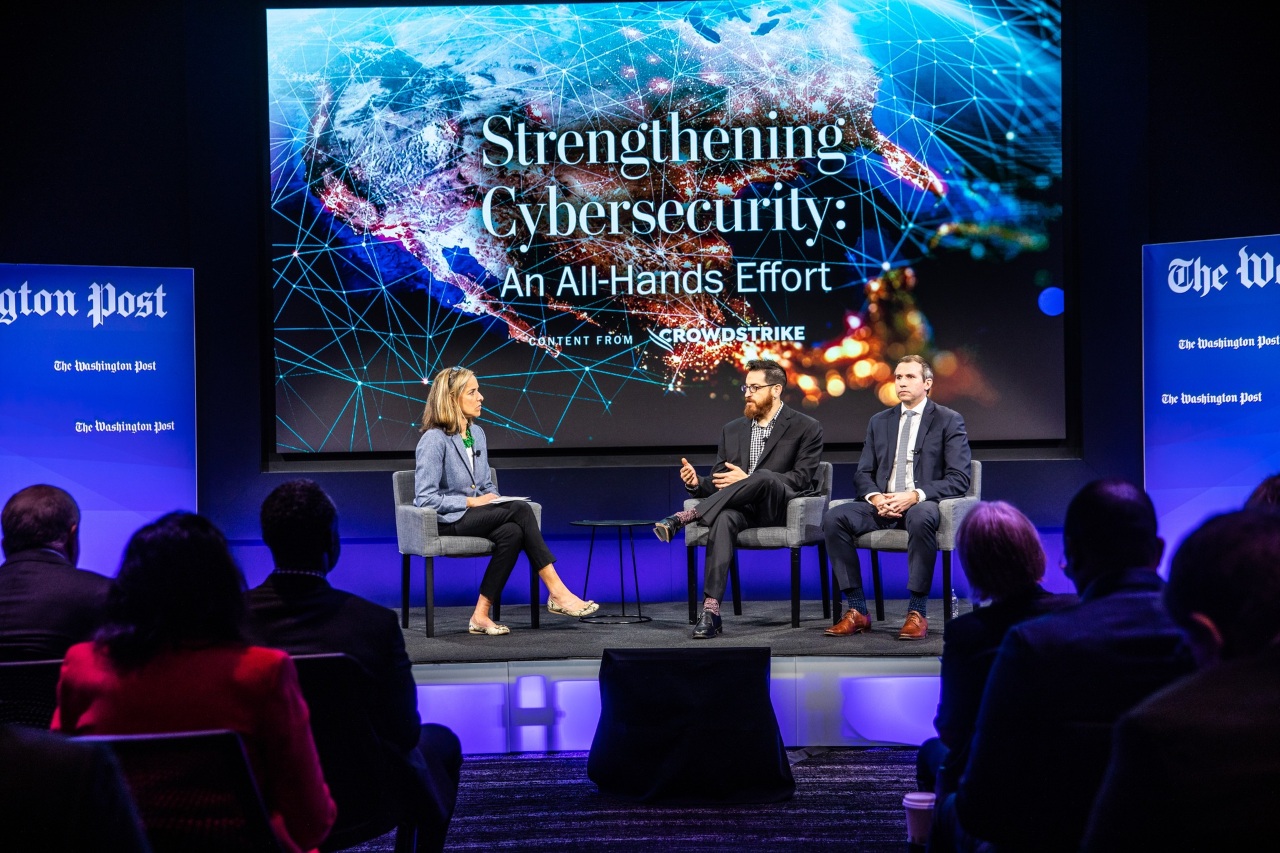
Securing Cyberspace
On October 13, 2022, Professor Sasha O'Connell took part in a Washington Post Live policy discussion titled Securing Cyberspace: An All-Hands Effort. O'Connell was joined by Chris DeRusha, Federal CISO, and Adam Meyers, Senior VP of Intelligence at CrowdStrike. Watch the video of this segment.
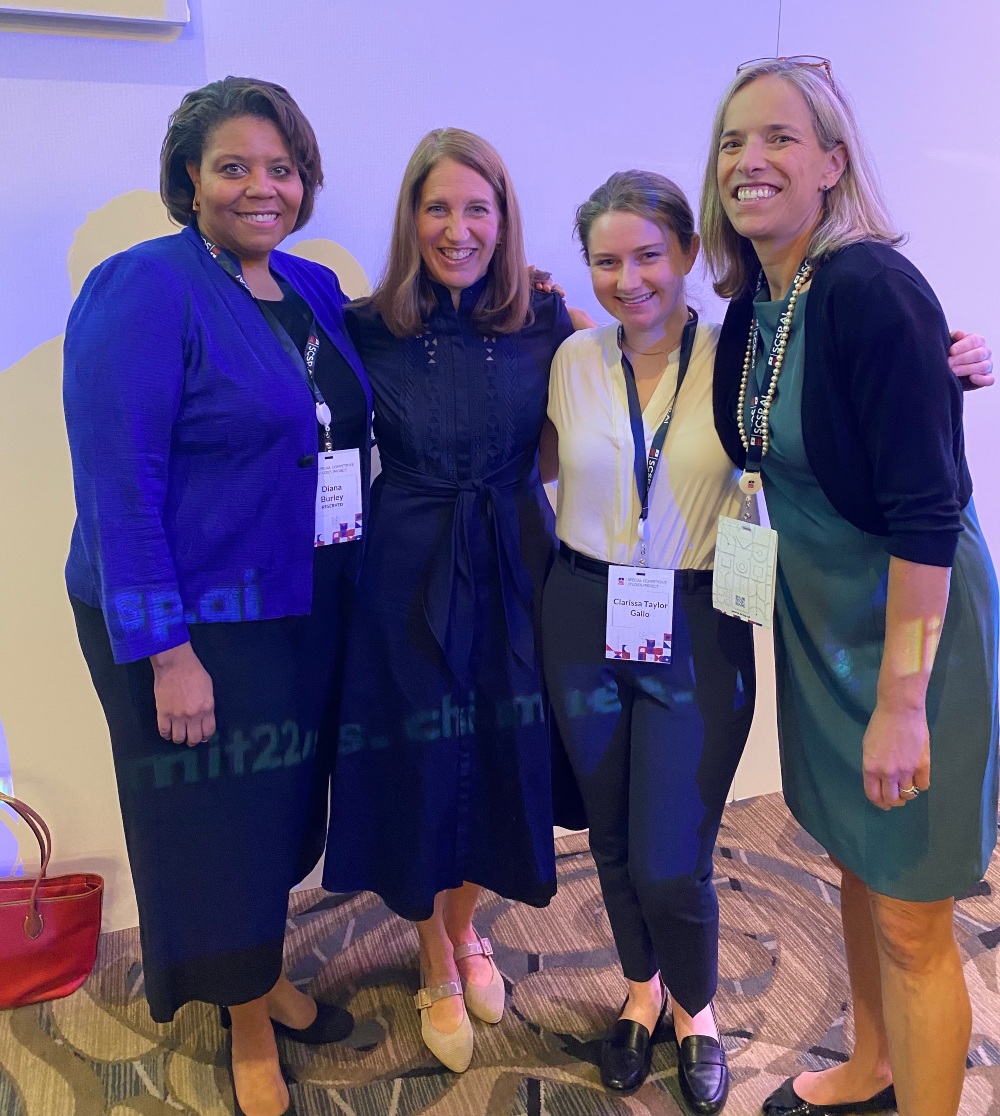
Global Emerging Technology Summit
On September 16th, 2022, dozens of scholars, federal employees, policymakers, and technology professionals assembled at the first-ever Global Emerging Technology Summit. Hosted by the bipartisan, nonprofit Special Competitive Studies Project (SCSP), the event convened technology leaders from across sectors to discuss the national status quo on emerging technologies, and how to sustain the U.S.’ competitive advantage over a fast-developing China.
The impressive slate of lecturers and panelists included AU President Sylvia Burwell, Condoleezza Rice, and Henry Kissinger. National Security Advisor Jake Sullivan opened the summit by explaining the four pillars of America's tech strategy: 1) investing in our science and technology ecosystem; 2) nurturing top-STEM talent; 3) protecting our technology advantages; and 4) optimizing allies and partnerships. Panels covered the future of geopolitics, democracy, innovation, platforms, and warfare.
President Burwell explicated the role of student engagement.
"At a university you are a microcosm of all of these problems, whether it is the misuse of technology and misinformation…and the division and the divisiveness in terms of undermining democracy," said Burwell. "At American University, we tell our students three things: get your facts; take it off social [media]; and get it in a room. By Princeton Review's standing, we are the most politically-active campus in the nation's capital."
Kissinger, who served as national security advisor under Nixon and Ford, spoke on the race with China. “The fundamental challenge is [to] protect the security of the country, and, at the same time, leave open a vision of the future, and to do all of that without destroying humanity,” he said.
The Global Emerging Technology Summit painted an optimistic picture of the United States’ technological future while cautioning participants on the potential harm from misuse and abuse of such powerful innovations. For more information, visit the SCSP website.
SPA was proud to adapt this piece from a blog post by student Clarissa Gallo (MS THSP, `23), who represented the school at the SCSP event.
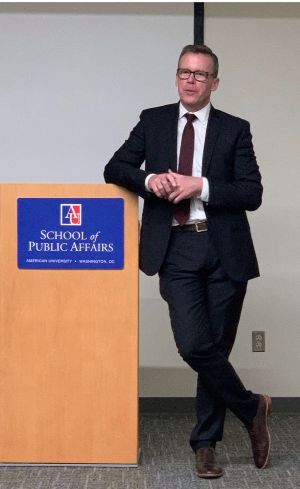
Building A Career in Cybersecurity & Protecting Our Nation's Critical Infrastructure
American University's School of Public Affairs students had the opportunity to meet with Adam Lee, Vice President and Chief Security Officer for Dominion Energy. Adam's team protects an energy company that employs 17,000 people, serves 7 million customers across 13 states, and has a market capitalization of over $61 billion. He is also a former FBI division chief who spoke with students about his remarkable career as well as current cyber threats and challenges as well as strategies for response and resilience in this environment.
National Security Cyber Careers in the Federal Government
March 17 | 12– 1:30pm | Online
The School of Public Affairs at American University hosted a virtual panel and Q&A session titled “National Security Cyber Careers in the Federal Government,” co-sponsored by the Pi Delta Nu chapter of the Alpha Phi Sigma Criminal Justice Honor Society and the AU SPA Tech Policy Association.
The event featured panelists who are cybersecurity experts from the Federal Bureau of Investigation, National Security Agency, United States Secret Service, and Cybersecurity and Infrastructure Security Agency, who discussed the day-to-day work of cyber professionals at their agencies, and offered their thoughts and perspectives on the unique challenges faced when addressing new cyber threats. Panelists also provided information on career paths, recruiting efforts of their agencies, eligibility requirements, and preparation recommendations.
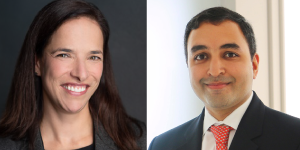
Analyzing the New National Cyber Director Role
Online Talk & Interview
Tuesday, January 26, 2021 | 10:00am - 11:00am (ET)
The Cyber Project at Harvard’s Kennedy School welcomes Sasha O’Connell (SPA Executive in Residence & Director of the Terrorism and Homeland Security Policy Master's Program), Kiran Raj (SPA adjunct professor), and Tatyana Bolton (former senior policy director for the U.S. Cyberspace Solarium Commission) in conversation with Lauren Zabierek to analyze the National Cyber Director role.
Sasha and Kiran recently published their report, The United States Needs a Cyber Director: A Roadmap for Making It Happen in 2021. You can access the Cyber Solarium Commission report here.
Life on an FBI Cyber Squad
October 21 | 12-1PM ET | Online
American University's School of Public Affairs and the FBI came together to host a first-of-its-kind event, which explored a day in the life of an FBI cyber squad.
The event presented the different technical career paths at the FBI from the people who live it every day. How do a special agent, staff operations specialist, and computer scientist work together to solve a case? What skills and experiences led them down their career paths? What insights could these mid-career professionals offer future applicants?
Video
In "True or False," former CIA analyst Cindy Otis took readers through the history and impact of misinformation over the centuries, sharing stories from the past and insights that readers today can gain from them. Then, she shared lessons learned in over a decade working for the CIA, including actionable tips on how to spot fake news, how to make sense of the information we receive each day, and, perhaps most importantly, how to understand and see past our own information biases, so that we can think critically about important issues and put events happening around us into context.
For more information about the Cyber Policy & Management graduate certificate, contact the SPA Cyber Certificate team at spacybercert@american.edu.

